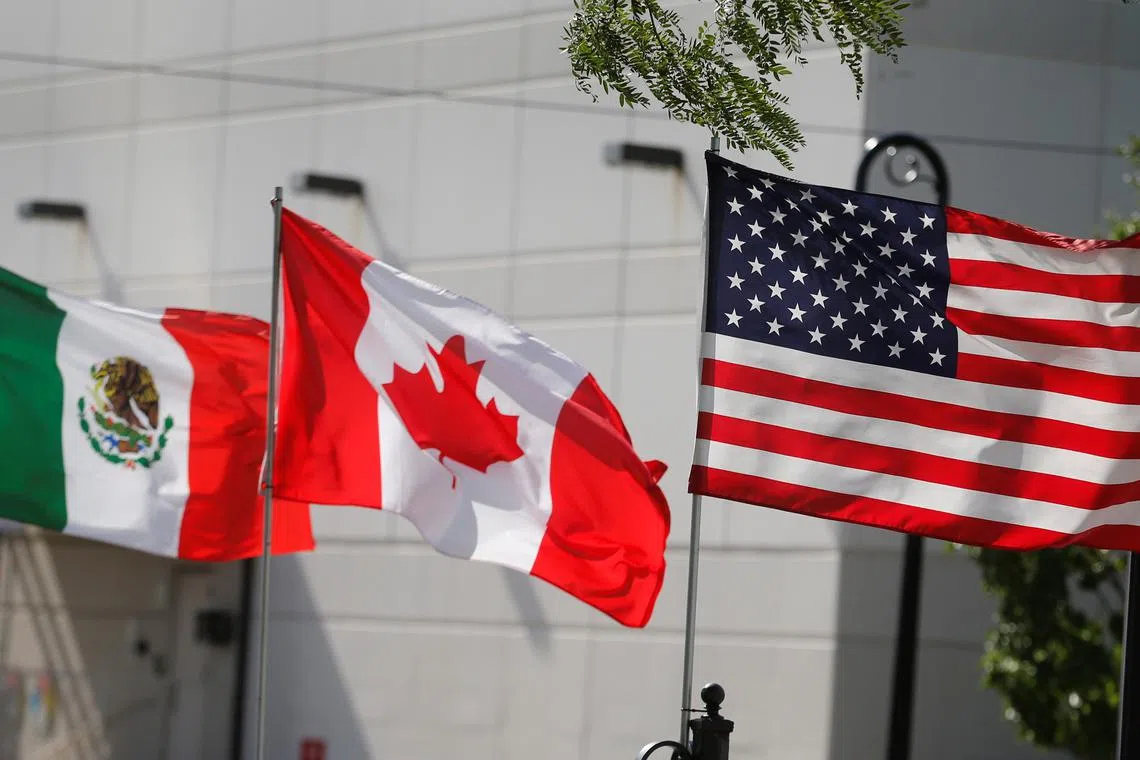White House says Trump to impose Canada, Mexico, China tariffs at weekend
Sign up now: Get ST's newsletters delivered to your inbox

Mr Trump reiterated his plans for 25 per cent tariffs on neighbours Canada and Mexico, over the flow of the deadly drug fentanyl into the US.
PHOTO: REUTERS
WASHINGTON - President Donald Trump will implement tariffs on Feb 1 on the three largest US trading partners - Canada, Mexico and China - the White House said, sparking alarm for global trade.
Mr Trump has reiterated his plans for 25 per cent tariffs on neighbours Canada and Mexico, saying they have failed to crack down on illegal migrants crossing the US border and the flow of fentanyl.
He also threatened a 10 per cent duty for Chinese goods on the same day, similarly over the drug.
“The Feb 1 deadline that President Trump put into place at a statement several weeks ago continues,” White House spokeswoman Karoline Leavitt told reporters on Jan 31.
“Both Canada and Mexico have allowed an unprecedented invasion of illegal fentanyl that is killing American citizens, and also immigrants into our country,” she added.
She did not commit to exemptions on sectors, and rejected warnings that this would spark a trade war.
On Jan 31, Mr Trump told reporters in the Oval Office that he was “absolutely” going to impose tariffs on the European Union in future too, saying the bloc has “treated us so terribly.”
Canadian Prime Minister Justin Trudeau vowed on Jan 31 an “immediate response” if Mr Trump acted, while Mexican President Claudia Sheinbaum said her government was in close contact with Mr Trump’s administration.
The US president has not specified tools he would use, though analysts suggest he could tap emergency economic powers, which allow the president to regulate imports during a national emergency. But this could be hindered by lawsuits.
Fentanyl has been responsible for tens of thousands of overdose deaths a year.
Beijing has rebuffed claims of its complicity in the trade, while close US ally Canada has countered that below one per cent of undocumented migrants and fentanyl entering the US comes through its northern border.
Some analysts believe tariff threats are a bargaining chip to accelerate the renegotiation of the existing trade deal known as USMCA between the US, Mexico and Canada.
“However, potentially dismantling a decades-long free-trade area could be a significant shock,” said a recent JPMorgan note.
Tariffs are paid by US businesses to the government on purchases from abroad and the economic weight can fall on importers, foreign suppliers or consumers.

White House press secretary Karoline Leavitt confirmed a Feb 1 deadline for tariffs on Canada, Mexico and China.
PHOTO: AFP
Recession risks
Assistant Professor Wendong Zhang, of Cornell University, said Canada and Mexico would suffer the most under 25 per cent US tariffs and with retaliations.
“Canada and Mexico stand to lose 3.6 per cent and 2 per cent of real GDP respectively, while the US would suffer a 0.3 per cent real GDP loss,” he added.
Oxford Economics analysts warned that blanket tariffs and pushback could tip Canada and Mexico into recessions, and that the US also risks a shallow downturn.
Mexico’s biggest export sectors - food and beverages, transport equipment and electronics - account for the bulk of its manufacturing activity, said Ms Joan Domene of Oxford Economics.
Canada exported nearly 80 per cent of its goods to the United States in 2023, and accounts for nearly 60 per cent of US crude oil imports, noted the Congressional Research Service.
It is unclear if oil imports may be exempted.
Canadian heavy oil is refined in the US and regions dependent on it may lack a ready substitute.
Canadian producers would bear the brunt of tariffs but US refiners would also be hit with higher costs, said Mr Tom Kloza, of the Oil Price Information Service. This could bring gasoline price increases.
US merchandise imports from both countries largely enter duty free or with very low rates on average, said the Peterson Institute for International Economics.
A tariff hike would shock industrial buyers and consumers.
‘Grand bargain’
Mr Trump is also mulling more tariffs on Chinese goods.
Beijing has vowed to defend its “national interests,” and a foreign ministry spokeswoman previously warned that “there are no winners in a trade war.”
During election campaigning, Mr Trump raised the idea of levies of 60 per cent or higher on Chinese imports.
Mr Isaac Boltansky, of financial services firm BTIG, expects “incremental tariff increases” on Chinese goods.
“Our sense is that Trump will vacillate between carrots and sticks with China, with the ultimate goal being some sort of grand bargain before the end of his term,” he said in a note. AFP


